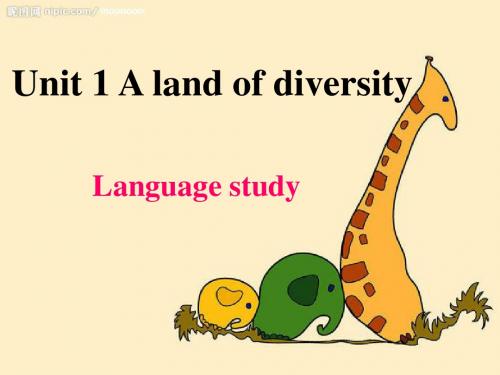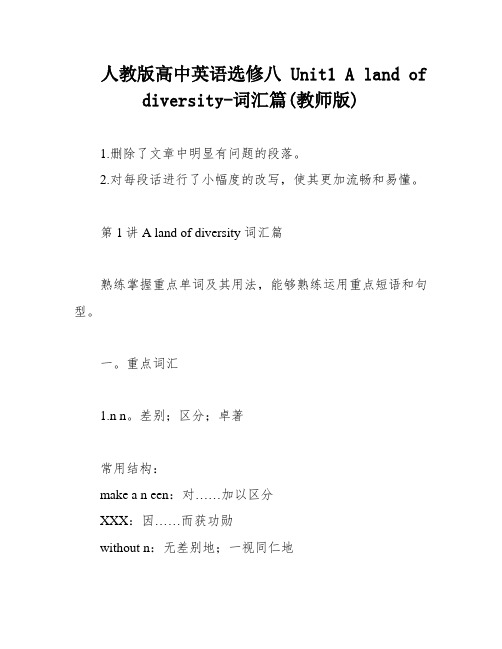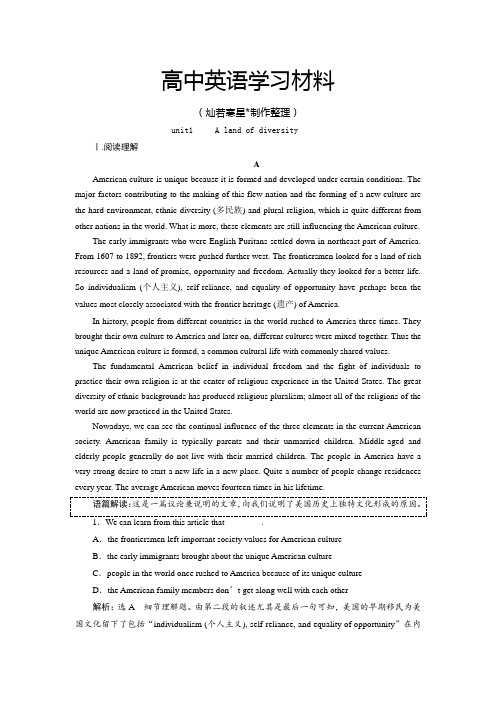选修八unit 1 A land of diversity
高中英语 选修8 语言点讲解Unit 1 A land of diversity

no distinct major racial
在考试中的成绩不好。
or cultural groups, but simply a mixture of many races and cultures. 人们认为,要不了多久,
that
从句。
_I_t_'_s_b_e_li_e_v_e_d_t_h_a_t___ _te_e_n_a_g_e_r_s_w__it_h_o_u_t___ h_a_v_i_n_g__b_r_ea_k__fa_s_t_w__il_l _ _n_o_t_o_n_l_y_f_a_ll_a_s_l_ee_p__
mind. 3.A signal may be given by means of flags, lights, and guns. 4.If you team up with your classmates, you will surely get the
same work done far better. 5.These teenagers don't know much of the world yet; that's
显然地;显而易见地 14.conductor n.(公车)售票员;列车员;(乐队)指挥→_c_on__d_u_c_t v.
管理 15.slip vi.滑动;滑行;滑跤 n.滑动;滑倒 → slippery adj.滑的 16.punishment n.惩罚;处罚→ punish vt.惩罚;处罚
[语境活用]
多种国籍的混合将会非
_e_a_si_l_y_i_n_c_l_a_ss__, but
常之大,以至于不可能存
concentrate less on
在一种明显的、主要的种
选修8_Unit1_A_land_of_diversity language study

7. Exactly when the first people arrived in what we now know as California, no one really knows.
exactly adv. 1. 确切地,精确地;完全地 Tell me exactly where she lives. 2. 恰好地,正好地 That's exactly what I expected. 3. (用于答语)一点不错
probable的主语不能是人。
9. by means of 借助……手段;依靠……方法 all means 当然可以;尽一切办法; 不惜一切地 by ____ no means 决不;完全不是 by ____ this means 用这种方法 by ____ Sometimes teachers and parents judge whether by means of what we are good or not simply ____________ grade we get in exams. That’s why we try to get by all means and some even cheat high grades _____________ By this means in exams. _________________ they may get higher grades and please their parents for a while. But then most of them will feel upset or even by no means should we cheat in ashamed. So _____________ exams.
高中英语讲义:选修八 unit 1 a land of diversity 含答案

Unit 1 A land of diversity一、刷黑板——词汇全听写(先过识记默写关)Ⅰ.阅读词汇(英译汉)[第一屏听写]1.strait n.海峡2.Arctic adj. 北极的;北极区的3.the Arctic 北极4.ministry n. (政府的)部;(全体)牧师;牧师的职责5.federal adj. 联邦制的;联邦政府的[第二屏听写]6.nephew n.侄子;外甥7.aircraft n. 飞行器;航空器;飞机8.vice n.& adj. 代理;副职9.shave vt.&vi. 刮;剃10.tram n. (有轨)电车11.bakery n. 面包房;面包厂[第三屏听写]12.ferry n.渡船;渡口vt. 摆渡;渡运13.seagull n. 海鸥14.cattle n. 牛(总称)15.mourn vt.&vi. 哀悼;悼念;表示悲痛16.authority n. 权威;权力(pl.) 当局;官方Ⅱ.高频词汇(汉译英)[第四屏听写]1.distinct adj. 清晰的;明显的;明确的2.distinction_ n. 差别;区分;卓著3.immigrant n. (从外国移入的)移民4.immigrate vi. 移入(外国定居)5.immigration n. 移民;移居入境6.means_ n. 手段;方法7.majority_ n. 大多数;大半[第五屏听写]8.despite prep. 尽管;不管9.hardship n. 苦难;困苦10.elect vt. 选择;决定做某事;选举某人11.boom n. (人口、贸易的)繁荣vi. 处于经济迅速发展时期12.racial adj. 人种的;种族的13.crossing n. 横渡;横越;十字路口;人行横道[第六屏听写]14.rail n.铁路;扶手;(护栏的)横条15.percentage n. 百分比;百分率16.pole n. 地极;电极;磁极17.applicant n. 申请人18.customs n. 海关;关税;进口税19.socialist n. 社会主义者;社会党人adj. 社会主义者的[第七屏听写]20.socialism n.社会主义21.occur vi. 发生;出现22.indicate vt. 指出;标示;表明;暗示23.luggage n. 行李(〈美〉baggage) 24.apparent adj. 显而易见的;显然的;表面上的25.apparently adv. 显然地;显而易见地26.brake n. 闸;刹车;制动器vi.&vt. 刹(车);用制动器减速[第八屏听写]27.conductor n.(公车)售票员;列车员;(乐队)指挥28.slip vi. 滑动;滑行;滑跤n. 滑动;滑倒29.hire vt.& n. 租用;雇用30.fascinating adj. 迷人的;吸引人的31.angle n. 角;角度。
人教版高中英语选修八 Unit1 A land of diversity-词汇篇(教师版)

人教版高中英语选修八 Unit1 A land of diversity-词汇篇(教师版)1.删除了文章中明显有问题的段落。
2.对每段话进行了小幅度的改写,使其更加流畅和易懂。
第1讲 A land of diversity 词汇篇熟练掌握重点单词及其用法,能够熟练运用重点短语和句型。
一。
重点词汇1.n n。
差别;区分;卓著常用结构:make a n een:对……加以区分XXX:因……而获功勋without n:无差别地;一视同仁地拓展:distinct adj。
清晰的;明显的;明确的XXX。
在某方面与……不同XXX。
他有很明显的绘画天赋。
You should make your writing distinct。
你应该把字写清楚。
2.means n。
手段;方法(单数和复数形式相同)常用结构:by means of:用……办法;借助……by all means:一定,务必;好的,当然可以by no means:决不,一点也不(位于句首时,句子用部分倒装)by every means:用尽一切可能的办法易混辨析:means/way/methodmeans 指“方法、方式、工具”,着重于具体的手段(单复数形式相同)。
way 指“一般的方法、方式或个人的特殊方法、方式”,与技巧或效果的好坏无关。
method 指“有系统的、有效率的精心拟定的方法”,也可以指抽象概念“条理”。
a way to do sth。
/ a way of doing sth。
/ a method of doing sth。
做……的方法in this way / with the method / by this means:用这种/些方法by XXX:顺便问一下on one’s way to。
在去……的路上in the way:挡住路注意:XXX。
They used white paint to mark out the XXX。
高中英语选修8 Unit 1

(4)_ra_c_i_a_l adj. 人种的; 种族的→_r_a_ce_ n. 种族; 比赛 (5)_a_p_p_ly_ vt. 申请→_a_p_p_l_ic_a_t_i_o_n n. 申请→_a_p_p_l_ic_a_n_t_ n. 申请人 (6)_in_d_i_c_a_t_e vt. 指出; 标示; 表明; 暗示→_in_d_i_c_a_t_io_n_ n. 迹象→_in__d_ic_a_t_o_r n. 指示器; 指示物 (7)_a_p_p_a_r_e_n_t adj. 显而易见的; 显然的; 表面上的→ _a_p_p_a_r_e_n_t_ly_ adv. 显然地; 显而易见地
3. How many candidates are standing for _e_le_c_t_io_n_ (elect)? 4. He was sent to his room as a _p_u_n_i_s_h_m_e_n_t_ (punish).
Ⅱ. 用以上适当的短语填空 1. It was becoming more and more difficult to _li_v_e_o_n_ his salary. 2. The water may be carried _b__y_m__e_a_n_s_o_f_ a pipe. 3. They will certainly need to _ta_k_e__in_ plenty of liquid.
【知识拓展】
means
表示“方法、手段、工具”, 常与介词by连 用
method
指做某事的具体步骤或程序, 也指系的、抽 象概念的原理, 常与介词of搭配
way
是最常用的词, 本意是“通路”, 引申作 “方式、方法”讲, 含义很广
Unit1-A-land-of-diversity基础知识-新人教版选修8

Unit 1A land of diversity——多元化的社会重点单词1.means n. [C]方法;手段(单复数同形)(1)means作为一个单复数同形的名词,常及主谓一致结合起来进行考查。
要注意,means作主语时,前有every, each, one等修饰语时,谓语动词用单数;前有several, some, many, few, all等修饰语时,谓语动词用复数。
means n.手段;方法;mean v.意思是;打算by all means当然可以,一定,务必by means of 依靠by no means 绝不,一点也不by this means =in this way用这种方法means of travel /transportation交通方式【易错提示】(1)当means作主语且有every, each, one等词修饰时,谓语动词用单数;有some, several, many, few等词修饰时,谓语动词用复数。
(2)by no means放到句首时,句子用部分倒装语序。
By no means shall I do it.我绝不会干那事。
Every possible means has been tried, but none worked.=All means have been tried, but none worked.各种办法都尝试了,但没有一种奏效。
way 多及in连用,构成in...waymethod 多及with连用,构成with...methodmeans 多及by连用,构成by...meansapproach 多及to连用,构成approach to...用means, method, way和approach的适当形式填空。
(1)He thought of an efficient________to the study of English idioms.(2)He solved the problem by this________.(3)She tried to find a________to solve the puzzle.(4)We have no better ideas, so let's try your________.(5)By no means________such a good opportunity!A.shall I miss B.I shall missC.miss I D.I miss2.majority n. 大多数;大半点拨:(1)单独用作主语,谓语动词用单数、复数均可。
高二英语选修八unit 1 a land of diversity 课件

make a life
elect
• 选举;选择;推选 • The people of the Philippines have elected
a new president.
• 法国人民即将选举出一位新总统。
• n. election
移民
• immigrate v. • immigrant n. • immigration n.
house?" -"Yes, by all means."
ministry
• Finance Ministry 财政部 • foreign ministry • ministry of education • ministry of agricultureCat Nhomakorabeaolic
天主教、东正教、新教被统称为基督教,都 以“圣经”为经典。
Unit 1 A land of diversity
distinct
a. 1.与其他不同的,有区别的[(+from)]
[different] 2.明显的,清楚的;确定无误的 3.难得的
distinction
名词 n. 1.差别;区别,分清[(+between)] 2.不同点;特征,特性 My writing has the distinction of being instinct. 3.荣誉;著名 4.优秀;卓越
A panda lives on bamboo leaves. [以...为食;靠...生活]
the Arctic
the Antarctic
means
mean v. 意思是;打算(mean的第三人称
单数) a. 小气的;吝啬的 n. 手段;方法;财产
人教版高中英语选修八unit1 A land of diversity

高中英语学习材料(灿若寒星*制作整理)unit1 A land of diversityⅠ.阅读理解AAmerican culture is unique because it is formed and developed under certain conditions. The major factors contributing to the making of this flew nation and the forming of a new culture are the hard environment, ethnic diversity (多民族) and plural religion, which is quite different from other nations in the world. What is more, these elements are still influencing the American culture.The early immigrants who were English Puritans settled down in northeast part of America. From 1607 to 1892, frontiers were pushed further west. The frontiersmen looked for a land of rich resources and a land of promise, opportunity and freedom. Actually they looked for a better life. So individualism (个人主义), self-reliance, and equality of opportunity have perhaps been the values most closely associated with the frontier heritage (遗产) of America.In history, people from different countries in the world rushed to America three times. They brought their own culture to America and later on, different cultures were mixed together. Thus the unique American culture is formed, a common cultural life with commonly shared values.The fundamental American belief in individual freedom and the fight of individuals to practice their own religion is at the center of religious experience in the United States. The great diversity of ethnic backgrounds has produced religious pluralism; almost all of the religions of the world are now practiced in the United States.Nowadays, we can see the continual influence of the three elements in the current American society. American family is typically parents and their unmarried children. Middle-aged and elderly people generally do not live with their married children. The people in America have a very strong desire to start a new life in a new place. Quite a number of people change residences every year. The average American moves fourteen times in his lifetime.语篇解读:这是一篇议论兼说明的文章,向我们说明了美国历史上独特文化形成的原因。
- 1、下载文档前请自行甄别文档内容的完整性,平台不提供额外的编辑、内容补充、找答案等附加服务。
- 2、"仅部分预览"的文档,不可在线预览部分如存在完整性等问题,可反馈申请退款(可完整预览的文档不适用该条件!)。
- 3、如文档侵犯您的权益,请联系客服反馈,我们会尽快为您处理(人工客服工作时间:9:00-18:30)。
BOOK 8 Unit 1 A land of diversityPeriod 1 Warming up and ReadingTeaching goals1.Enable the students to talk about things about the USA.2.Help the students learn the huge diversity of races and cultures in America,especially in California.Teaching important and difficult pointsLearn the huge diversity of races and cultures in California.Teaching methodsFast and careful reading; asking and answering activity; individual, pair or group work.Teaching aidsA map, a blackboard and a computerTeaching proceduresStep 1 Warming up.1.Ask the students to describe what they learn about the USA.2.Group work: look at the map of the USA with your group. Write on the map thenames of as many of the following as you can. Compare your names with other groups.Step 2 Pre-reading1.Ask the students to tell things about California including its location, size,population, economy, history etc. What do you learn about California?2.Show the students some pictures and encourage students not only to say what eachpicture is about but how each one relates to California.Step 3 Fast reading1.Read through the passage and get the main idea.2.Reading comprehension.Ask the students the following questions:1)When you look at the title, what so you think of ?2) Why is the USA called a melting pot?Beside each date note down an important event in Californian history.Step 4 Detail readingBeside each cultural group, write the period in which they first came to California in large numbers.Step 5 Post-readingWhy is California in the 21st century such a multicultural community? (Using 3 or 4 sentences to explain.)Step 6 HomeworkFinish “Learning about language” on page 4.Period 2 Language pointsTeaching aims:1.Learn expressions and phrases.2.Learn language points.Teaching methods:Presentation and practiceTeaching proceduresStep 1 RevisionRetell the passage and finish a summary of this passage.Step 2 phrasesStep 3 Language points1. means: a method or a way of doing. 方式,方法,手段(但复数同形)Translate:一切可能的办法都试过了。
All possible means have been tried.= Every possible means has been tried.by means of : by using 依靠,凭借2.occur: come into sb’s mind (想起,想到) happen, take place(发生)1)When did the accident occur?发生2)A good idea occurred to me all at once.想到3.multi-前缀,是“多,多方面,多方向”的意思mono-前缀:one, single 单e.g.: a monolingual dictionary(单语词典)bi-前缀:two, twice, double双e.g.: a bilingual dictionary(双语词典)4.Declare v.宣告,声称,宣称,申报translate the following sentences1) War was declared on the enemy.2) She declared that she knew nothing about it.3) Have you anything to declare.5.Keep up:保持,坚持,持续The rain kept up for two days and the roads were flooded.Step 4 Exercises: translation1.我就是想不起他的名字.(occur)2.他宣称他是正确的.(declare)3.鼓起勇气,成功就属于你.(keep up)4.他虽然不会说话,但能通过手势让别人知道他的意思.(by means of) Step 5 HomeworkReview the language points.Period 3 GrammarTeaching aims1.Enable the students to use the Noun Clauses as the subject, object, predicative andappositive.2.Help the students learn how to use the Noun Clauses.Teaching important and difficult pointsDiffer the noun clauses.Teaching methodsAnalysis and have some discussions.Teaching proceduresStep 1 PreparationAsk the students to underline the noun clauses in the following sentences. Then tell what types of noun clauses they are.1) Whether native Americans arrived in California 15,000 years ago or 14,000 years ago is not important. Subject clause(主语从句)2) The fact that they arrived a long time before Europeans is what matters. Appositive clause(同位语从句) & Predicative clause(表语从句)3) I believe that the native Americans were treated badly when the first Europeans came. Object clause(宾语从句)Step 2 DiscussionAsk the students to differ the Noun Clauses as the subject, object, predicative and appositive.Step 3 Analysis1)名词性从句的语序(陈述句语序);2)几对重要关联词的区别:whether\if, what\that, what\whatever, who\whoever, etc;3)it用作形式主语或形式宾语代替主语从句或宾语从句;4)根据具体情景选用适当的关联词。
2.根据例句,讨论:1)whether\if的区别I. Please tell me if/whether you will go to the lectures tomorrow.II. It all depends on whether the sky will clear up.III. The question is whether the film is well worth seeing.IV. Whether he will be well tomorrow I’m not sure.A.引导宾语从句,位于及物动词后B.引导宾语从句,位于介词后C.引导宾语从句,放句首D.引导表语从句,主语从句或同位语从句2)What\that的区别I. I think that it is unnecessary for me to speak louder.II. His mother is satisfied with what he has done.III. That he was able to come made us happy.IV. This is what makes us interested.V. The reason was that Tod had never seen the million-pound note before.3)who\whoever; what\whatever的区别I. The spoken English competition is coming. Who will attend the meeting hasn’t been decided yet.II. I believe whoever takes part in the competition will try his best.III. Can you tell me what you would like to order?IV. Whatever happens, don’t be surprised.V. All the food here is delicious. Just order whatever you like.4)常见的it作形式主语的结构I. It is a fact that he won the match.II. It is necessary that we do study the English.III. It is known to all that light travels in straight lines.IV. It seemed that he would come here.Step 4 Practice1)Exs.3&4, Students Book P52)Make sentences using noun clauses as the subject, object, predicative and appositive.Step 5 HomeworkReview what we have learnt today.Period 4 Listening and speakingTeaching goalsTrain their listening and speaking abilities.Teaching important and difficult pointsHelp the students to talk about position, space and direction and illustrate ways that listeners indicate that they are listening to the speaker.Teaching methodsPair work and group work, discussion and cooperationTeaching aidsA recorder, a computer, and a blackboardTeaching proceduresStep1 Listening1.The first time the students listen to the tape they are expected to listen for the gistonly. Read Ex1 on page 6 with students so that they know what to listen for and play the recording right through without stopping.4 Geographic areas of California2 Where G eorge’s tour started3 California not as George expected1 Where George is now5Californian people2.Read the postcard on page 6 with students and ask them to recall the missinginformation. Then play the tape right through while students listen for the missing details. Play it twice if necessary and then check answers by playing the tape again and stopping when the missing details are given.Dear Sam,I’m here in Joshua Tree National Park, in the southeastern_part of California. Have been traveling around the state of california for three weeks now. Very different from what I have seen in _American movies_ . Not everyone is ___rich__ and not everyone lives near the__beach/coast_. First traveled southeast through richfarmland then to the central part. They grow everything here including cotton, nuts, vegetables and fruit. Cattle too. Then traveled further _southeast_into mountains and _desert_. Californians are very friendly, and they are from many different _races_and cultures. Every culture has its own __music__, ___festivals__, food and art. Most interesting.Wish you were here. Give my love to Paula.Yours,George3.Tell the students that when they listen to this time they are to focus on whatChristie, who is mainly listening, says. Play the tape and stop after each thing that Christie says so that students can write down her words according to the chart on page 7.4. Get the students to compare their answers with their partners and check the answers.Step 2 SpeakingWith a partner hold a telephone conversation about a place you have visited recently.1.Partner A: Talk about where the place is, what the climate is like, what youthought about the people, and any other interesting things you saw or did.Partner B: Encourage your partner to talk by asking questions and makingcomments.Step 3 HomeworkWrite a short passage about the place they have visited recently.Period 5 Using Language--readingTeaching goalsTarget languageUseful words and expressions: luggage, tram, apparently, slip, bakery, ferry, hire, seagull, immigration, team up with, mark out, take in, a great many.Teaching important and difficult points1.Improve the students’ reading ability (skimming and scanning).2.enable the students to grasp the useful words and expressions.Teaching methodsReading, discussion, cooperative learningTeaching procedures:Step 1 Lead-inI.Look at George’s photos. Then quickly read George’s diary. Write the days hesaw these things under the photos.II.Read George’s diary more slowly and answer the questions.1.Why did Andrew Hallidie invent the cable car system?He invented the cable car system because the horse-drawn trams used before were unsafe.2.Where did George eat lunch on his first day in San Francisco?He ate at Fisherman’s Wharf.3.Why did George hire a car? Why do you think he joined up with Terri andPeter?It was cheaper to hire a car with other people because they could share the cost. Also he probably enjoyed being in the company of other tourists. three things that visitors can do in Chinatown.Eat in Chinese restaurants, go to markets, visit temples and museums.5.What is Alcatraz Island famous for?The island used to be a very harsh prison for the most dangerous prisoners. III. Read George’s diary again. Put the mark”^” in the places where George has leftout some words. Discuss with others in your class: Why did George leave out some words when he wrote his diary?Step 2 Language points1.Team up with: make an effort in cooperation with; work together with与……协力从事,合作Translate:He teamed up with an experienced worker in the project.2.hire 解雇fire 租,雇佣1)You are _fired___, because you are so lazy for the work.2) I must ____hire_ a house when finding a job in the city.理解4)Don’t let yourself be taken in by these politicians.欺骗Take off 拆开,拆散Take on 贬低, 贬损名誉等Take apart 从事,对…..产生兴趣,打听,占用空间或时间Take away from 脱下,脱去,起居,休假,离开Take up 开始雇佣,露出,承担,接受Step 3 Pair work and consolidation.Make sentences with the new words learned in this lesson.Step 4 HomeworkRead the passage againPrepare for the diction of the useful words and expressions of this unitPeriod 6 WritingTeaching goals1.Enable the students to take an active part in searching for information and discussion.2.Enable the student to writ a short group essay about a city, province or zone in China and improve the students’ ability of writing.3.Enable the students to share their essays with other groups.Teaching important and difficult pointsHow to organize and write a short essay about a city, province or zone.Teaching methodsResearch, cooperative learningTeaching aidsA computer or some picturesTeaching procedures:Step 1 Discussion1.Get the students to discuss with the other members of their group which Chinesecity, province or zone they want to write about.2.Get the students to discuss their choices with other groups and make sure that eachgroup will be writing about a different place.3.Once the students have decided on a place, ask them to discuss what topics theywill write about and in what order they will write about them.Step 21.Get the students to give each person in the group one of the topics from the list towrite a paragraph about.2.Get the students to decide what they want to write in concluding paragraph. Itshould make a common on the future development of this place.3.Ask the students to write a clean copy of the whole essay.Step 3 SharingMake a wall display or a class booklet containing the essays from every group.。
